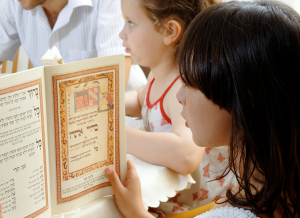 Last week, we spoke about the recurring themes of Passover in every generation: freedom from slavery under G-d, those who would hate us, and Divine Protection.
Last week, we spoke about the recurring themes of Passover in every generation: freedom from slavery under G-d, those who would hate us, and Divine Protection.
There is another aspect to the concept of “In Every Generation,” also found in abundance in the Haggadah: The importance of passing the message on to the next generation — to our children, and to anyone who has not yet had the opportunity to know.
As we proceed through the Haggadah, we see many different customs designed specifically to cause children and others to ask questions, to wonder why we are doing things differently than usual.
The Four Questions are considered a mandatory part of the Seder; one making the Seder alone would even recite the questions to him or herself, before answering them with the Haggadah. The theme of the Four Questions is, of course, “why is this night different than all other nights?” And those four questions are by no means an exhaustive list of the differences. Here are several more:
It is routine to wash our hands before eating a meal, but we don’t all go to wash, return to the table and merely have a small amount of a vegetable.
Before asking the Four Questions, the Seder plate is removed. This is done to inspire children to ask why the platter is being removed before anyone has eaten.
We describe four sons and the questions they would ask, making every participant think about the questions that they might ask.
We uncover and cover the matzoh, and lift our cups of wine, to call our attention at special moments. We take out some of the wine from our cups, either with fingers or by pouring, when mentioning each of the Plagues.
We point to the Matzah when we talk about it, and then to the Maror.
Anyone who has shared a Seder with children knows that they genuinely respond to all of these things, and teachers recognize that the Seder collects a range of proven pedagogical techniques to help convey information.
The Haggadah was designed because this information is so crucial, because it cuts to the essence of what makes the Jewish people distinct, of our mission in the world.
Recently, I came across a collection of “modern Seder resources,” referring to various other stories of slavery, racism and discrimination, and the need to fight these in all their forms. That last point is true, of course, but one who thinks that these things are needed to make the Seder “relevant” hasn’t gotten the message. The Seder, in all its aspects, is as relevant today as it was in any other generation. The Talmud says “all who add, subtract,” because often an addition distracts our attention from the main point and objective.
In one evening, we learn about the formation of our unique nation, our Divine Service, and even about the nature of those who would rather the transmission of G-d’s voice into the world be stopped.
We have so much to learn, and so much to transmit. May we merit this Passover to experience robust spiritual growth for ourselves and our children, as we celebrate the Seder.



